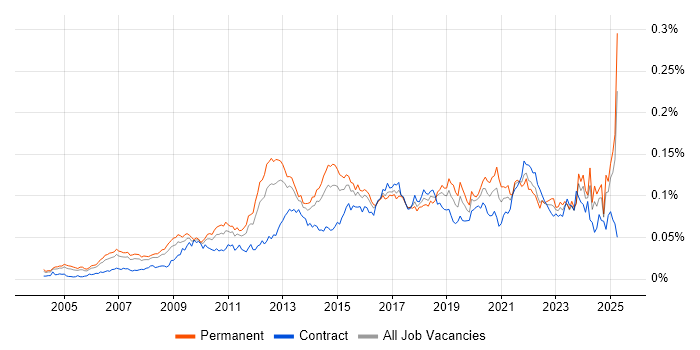Lead Solution Architect
UK
The median Lead Solution Architect salary in the UK is £94,637 per year, according to job vacancies posted during the 6 months leading to 15 May 2025.
The table below provides salary benchmarking and summary statistics, comparing them to the same period in the previous two years.
| 6 months to 15 May 2025 |
Same period 2024 | Same period 2023 | |
|---|---|---|---|
| Rank | 598 | 750 | 870 |
| Rank change year-on-year | +152 | +120 | +195 |
| Permanent jobs requiring a Lead Solutions Architect | 107 | 147 | 107 |
| As % of all permanent jobs advertised in the UK | 0.19% | 0.15% | 0.11% |
| As % of the Job Titles category | 0.21% | 0.16% | 0.12% |
| Number of salaries quoted | 42 | 77 | 76 |
| 10th Percentile | £70,000 | £71,227 | £72,125 |
| 25th Percentile | £83,750 | £72,493 | £78,691 |
| Median annual salary (50th Percentile) | £94,637 | £85,000 | £91,085 |
| Median % change year-on-year | +11.34% | -6.68% | +7.16% |
| 75th Percentile | £98,474 | £102,500 | £105,313 |
| 90th Percentile | £112,500 | £130,000 | £115,000 |
| UK excluding London median annual salary | £94,637 | £82,500 | £90,000 |
| % change year-on-year | +14.71% | -8.33% | +9.26% |
All Permanent IT Job Vacancies
UK
For comparison with the information above, the following table provides summary statistics for all permanent IT job vacancies. Most job vacancies include a discernible job title that can be normalized. As such, the figures in the second row provide an indication of the number of permanent jobs in our overall sample.
| Permanent vacancies in the UK with a recognized job title | 49,982 | 93,747 | 91,844 |
| % of permanent jobs with a recognized job title | 90.62% | 94.66% | 91.53% |
| Number of salaries quoted | 26,989 | 67,111 | 57,934 |
| 10th Percentile | £29,750 | £28,500 | £32,500 |
| 25th Percentile | £41,250 | £38,500 | £45,000 |
| Median annual salary (50th Percentile) | £56,000 | £52,500 | £60,000 |
| Median % change year-on-year | +6.67% | -12.50% | - |
| 75th Percentile | £74,014 | £71,250 | £80,750 |
| 90th Percentile | £96,250 | £90,000 | £100,000 |
| UK excluding London median annual salary | £51,645 | £50,000 | £53,000 |
| % change year-on-year | +3.29% | -5.66% | +6.00% |
Lead Solutions Architect
Job Vacancy Trend
Job postings that featured Lead Solutions Architect in the job title as a proportion of all IT jobs advertised.

Lead Solutions Architect
Salary Trend
3-month moving average salary quoted in jobs citing Lead Solutions Architect.
Lead Solutions Architect
Salary Histogram
Salary distribution for jobs citing Lead Solutions Architect over the 6 months to 15 May 2025.
Lead Solutions Architect
Top 9 Job Locations
The table below looks at the demand and provides a guide to the median salaries quoted in IT jobs citing Lead Solutions Architect within the UK over the 6 months to 15 May 2025. The 'Rank Change' column provides an indication of the change in demand within each location based on the same 6 month period last year.
| Location | Rank Change on Same Period Last Year |
Matching Permanent IT Job Ads |
Median Salary Past 6 Months |
Median Salary % Change on Same Period Last Year |
Live Jobs |
|---|---|---|---|---|---|
| England | +113 | 92 | £94,637 | +11.34% | 32 |
| UK excluding London | +145 | 83 | £94,637 | +14.71% | 21 |
| North of England | +69 | 71 | £94,637 | +21.13% | 8 |
| North West | +36 | 58 | £70,000 | -10.40% | 4 |
| Work from Home | +71 | 31 | £94,637 | +21.13% | 21 |
| London | +102 | 24 | £95,000 | -25.49% | 11 |
| Yorkshire | +48 | 13 | £94,637 | +14.71% | 4 |
| Scotland | +116 | 11 | £94,637 | +63.17% | |
| South West | +115 | 1 | £95,000 | - | 7 |
Lead Solutions Architect Skill Set
Top 30 Co-occurring Skills and Capabilities
For the 6 months to 15 May 2025, Lead Solutions Architect job roles required the following skills and capabilities in order of popularity. The figures indicate the absolute number co-occurrences and as a proportion of all permanent job ads featuring Lead Solutions Architect in the job title.
|
|
Lead Solutions Architect Skill Set
Co-occurring Skills and Capabilities by Category
The follow tables expand on the table above by listing co-occurrences grouped by category. The same employment type, locality and period is covered with up to 20 co-occurrences shown in each of the following categories:
|
|
||||||||||||||||||||||||||||||||||||||||||||||||||||||||||||||||||||||||||||||||||||
|
|
||||||||||||||||||||||||||||||||||||||||||||||||||||||||||||||||||||||||||||||||||||
|
|
||||||||||||||||||||||||||||||||||||||||||||||||||||||||||||||||||||||||||||||||||||
|
|
||||||||||||||||||||||||||||||||||||||||||||||||||||||||||||||||||||||||||||||||||||
|
|
||||||||||||||||||||||||||||||||||||||||||||||||||||||||||||||||||||||||||||||||||||
|
|
||||||||||||||||||||||||||||||||||||||||||||||||||||||||||||||||||||||||||||||||||||
|
|
||||||||||||||||||||||||||||||||||||||||||||||||||||||||||||||||||||||||||||||||||||
